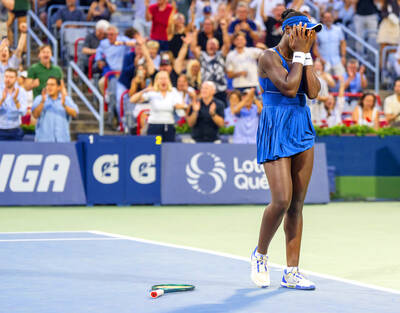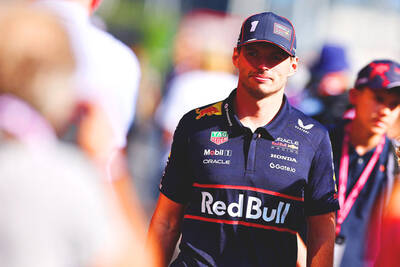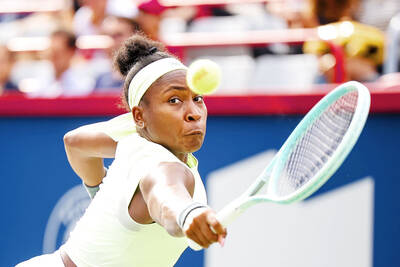Prehistoric Australian Aborigines could have outrun world 100m and 200m record holder Usain Bolt in modern conditions.
This and other eye-catching claims are detailed in a book by Australian anthropologist Peter McAllister entitled Manthropology.
McAllister sets out his stall in the opening sentence of the prologue.
“If you’re reading this then you — or the male you have bought it for — are the worst man in history,” he writes. “No ifs, no buts — the worst man, period ... As a class we are in fact the sorriest cohort of masculine Homo sapiens to ever walk the planet.”
McAllister believes proves that modern man is inferior to his predecessors in, among other fields, the basic Olympic athletics disciplines of running and jumping.
His conclusions about the speed of Australian Aborigines 20,000 years ago are based on a set of footprints, preserved in a fossilized claypan lake bed, of six men chasing prey.
An analysis of the footsteps of one of the men, dubbed T8, shows he reached speeds of 37kph on a soft, muddy lake edge. Bolt, by comparison, reached a top speed of 42kph during his then world 100m record of 9.69 seconds at last year’s Beijing Olympics.
In an interview McAllister said that, with modern training, spiked shoes and rubberized tracks, Aboriginal hunters might have reached speeds of 45kph.
“We can assume they are running close to their maximum if they are chasing an animal,” he said.
“But if they can do that speed of 37kph on very soft ground I suspect there is a strong chance they would have outdone Usain Bolt if they had all the advantages that he does,” he said.
McAllister said it was probable that any number of T8’s contemporaries could have run as fast.
“We have to remember too how incredibly rare these fossilisations are,” he said. “What are the odds that you would get the fastest runner in Australia at that particular time in that particular place in such a way that was going to be preserved?”
McAllister said a Neanderthal woman had 10 percent more muscle bulk than modern European man. Trained to capacity she would have reached 90 percent of Arnold Schwarzenegger’s bulk at his peak in the 1970s.
“But because of the quirk of her physiology, with a much shorter lower arm, she would slam him to the table without a problem,” he said.
Why the decline?
“We are so inactive these days and have been since the industrial revolution really kicked into gear,” McAllister replied. “These people were much more robust than we were.”
“At the start of the industrial revolution there are statistics about how much harder people worked then,” McAllister said.
“We are simply not exposed to the same loads or challenges that people were in the ancient past and even in the recent past, so our bodies haven’t developed,” he said.

Taiwan’s top women’s badminton doubles duo, Hsieh Pei-shan (謝沛珊) and Hung En-tzu (洪恩慈), achieved a straight-sets victory over Japan’s Kaho Osawa and Mayui Tanabe at the Badminton World Federation (BWF) Super 300 Macau Open on Sunday. The Taiwanese pair won the final 21-18, 21-12, marking the duo’s second title this year after their win at the BWF Super 300 Taipei Open in May. The match on Sunday was their first encounter with the Japanese duo, ranked No. 63 in the world. Hsieh and Hung, ranked No. 12, began the opening game well. Hung, who plays left-handed, performed strongly at both the net and the

Canadian teenager Victoria Mboko upset top-seeded Coco Gauff 6-1, 6-4 on Saturday night to reach the National Bank Open quarter-finals. “Your support was incredible,” Mboko told the crowd in French after a chorus of “Ole, Ole, Ole” chants echoed around the venue. “I’m really happy to win today ... It’s incredible. I’m so happy to beat such a great champion.” Gauff dropped to 2-3 since winning the French Open. She followed the major victory with opening losses in Berlin and Wimbledon, then overcame double-fault problems to win two three-set matches in Montreal. Gauff had five double-faults on Saturday after having 23 in

Formula 1 champion Max Verstappen on Thursday said that he is staying with the Red Bull team next year, ending months of speculation over his future. “Some people just like to stir the pot, some people just like to create drama, but, for me, it’s always been quite clear, and also for next year,” the four-time champion said ahead of the Hungarian Grand Prix. “I’m discussing with the team already the plans — the things that we want to change for next year, so that means that I’m also staying with the team for next year,” he said. Verstappen has a contract with

Alex Michelsen on Thursday rallied for a 3-6, 7-6 (7/4), 6-4 upset victory over third-seeded Lorenzo Musetti in the men’s singles, converting his seventh match point to reach the fourth round of the Canadian Open. Michelsen reached the last 16 of a Masters 1000 for the first time with his second win over a top-10 player in eight attempts. The 20-year-old American survived nearly 50 unforced errors and converted just two of nine break chances, but it was enough to vanquish Italy’s Musetti, a two-time Grand Slam semi-finalist ranked 10th in the world. “It feels really good,” the 26th-ranked Michelsen said. “I’ve put